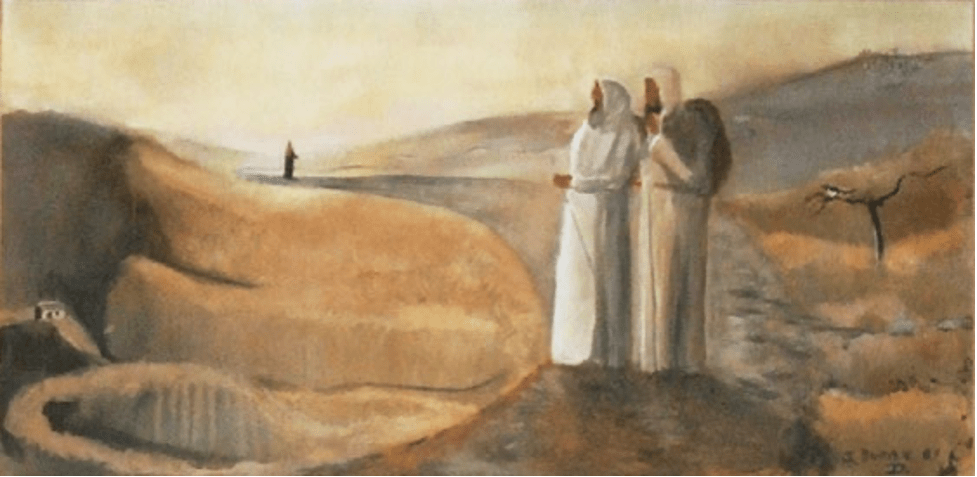“I want to be a Christian, but in spite of that, I want to be honest.”
Written by Rob Loane on August 23, 2023
Many years ago I sat down with a group of Biola University professors and fellow graduate students over lunch to hear Dr. Jim Houston from Regent College (Vancouver, BC) give a brief lecture. In his early seventies at the time, this small, Scottish man, with half a century of experience in the academic settings of Oxford University and Regent College—and a combination of scholarship, wisdom, and kindness that I had never experienced before this encounter—stood up to offer several points on the role of spiritual formation in the life of the Christian university.
After a few introductory thanks, he started his lecture with this biting statement: “I often say in such settings like this that ‘I want to be a Christian, but in spite of that, I want to be honest.’” He continued with a series of observations and then suggestions for the university, but it is his introductory words that have not left me alone since 1994, and I have no reason to think they will any time soon. Here, I will write them again:
“I want to be a Christian, but in spite of that, I want to be honest.”
My immediate response was to laugh. On one level, to speak of being honest in the Christian life seems so obvious that it does not even need to be repeated. Yet at another level, it unmasks the struggle of so much Christian experience in this world. Sadly for many, to be faithful to Jesus means putting their heads in the sand, denying the depths of problems that exist both in the world at large and in their hearts. For others, to be honest, means a rejection, or at least a suspicion, of anything hopeful.
In that one phrase, Dr. Houston named the tension that was becoming so apparent in my Christian experience at the time. It expressed both my condition and my deep longing. I wanted to live and love God and others with all my heart, truthfully and authentically. I did not want to just act like a Christian.
As a child and then an adolescent I learned faithfulness and obedience to Jesus sheltered from much of the ambiguity of life that I later discovered with exposure to a larger world and a deepened self-awareness. To be faithful seemed to simply entail “doing the right thing” as a high school and college student. But as disappointments “knocked the legs out from under me” after college, trust and confidence in God proved to be a struggle. His goodness and presence became doubtful to me. The answers I knew, the solutions that I had learned, seemed too small for my questions.
My understanding of God and faithfulness to Him were inadequate to deal with the circumstances around me and the currents within me. The temptation became very clear—to act like everything was OK, to deny the condition of my heart, to manage the chaos of my inner life, and to pretend that my life made sense Christianly. But the truth was that it didn’t. To speak of confidence in God seemed insincere and dishonest. In the depths of my heart, I felt like a fraud. I wanted to be a Christian. But despite that, I also wanted to be honest with where I was.
It was then—when I as an adult was first becoming acquainted with “the fraud hood” of my heart—that Dr. Houston’s words were so descriptive of my Christian existence. For amidst my confusion and need, I began to discover that the Spirit was inviting me to something deeper and more relational.
As this phrase continued to roam through the contours of my heart, it became a prayer (perhaps even a vocation). It intersected with other prayers like David’s, “But you desire honesty from the heart, so you can teach me to be wise in my inmost being” (Psalm 51:6), and “Search me, O God, and know my heart; test me and know my thoughts. Point out anything in me that offends you, and lead me along the path of everlasting life” (Psalm 139:23–24). Thomas Merton’s words also added to the prayer,
“It is not the will of God that we should obey Him while at the same time telling Him lies about our interior dispositions. If our dispositions are bad, let us ask Him to make them better, but let us not tell Him that they are really very good.”
I continue to find 30 years later that the pretense and dishonesty that can so easily capture my “faithfulness” amidst this complex and lonely world, actually distances me from an awareness of “the vital presence of God within and among us.” As I seek to make sense of my life in Christ, the worst thing that I can do is act like I am somewhere I am not or pretend that I am someone I am not. For, in the end, the only one deceived by such acting or pretending is me.
Thankfully, Dr. Houston’s confession over lunch years back offered me a new trajectory for living faithfully, honestly, and prayerfully in this world.
“I want to be a Christian, but in spite of that, I want to be honest.”
May this confession linger with you a bit. In Jesus’ name.
(This excerpt has been adapted from VantagePoint3’s The Journey Stage 2: Personal Foundations, 92-94).
For more on Dr. Jim Houston, I would encourage you to visit his personal website.





Linda Ferguson On August 25, 2023 at 8:58 am
Well written. Something to recall to memory at every level of life. It’s not as immediate and as sure as salvation, but a choice that one
must be aware of and made continuously. The scripture verses are poignant as we need our inconsistencies pointed out to us.
Rob Loane On September 12, 2023 at 1:03 pm
Great to hear your voice Linda… This is such an invitation that continues to be a gift and a challenge to me. Blessings…